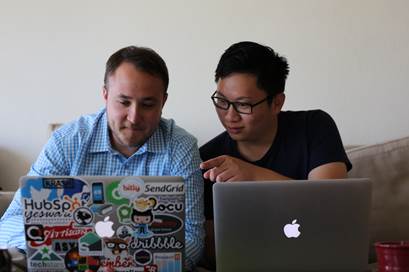
Sebastian Fung (BAFM ’12) graduated from the University of Waterloo with a Bachelor of Accounting and Financial Management in the fall of 2012. Having lived in Velocity during his third year of undergraduate studies, Sebastian was always intrigued by the prospect of starting his own company one day. After a short time in the corporate world post-graduation and meeting like-minded people willing to veer off the well-beaten path, Sebastian decided to start his own company.
With his three partners Sebastian co-founded LendLayer, a tool to help graduates tap into their under-used technical talent. Alumni Relations had the opportunity to speak with Sebastian about LendLayer and his journey from Waterloo.
Can you tell us about your journey from Waterloo to co-founding LendLayer?
After graduating from Waterloo and spending eight months at a Big 4 accounting firm, I rationalized that there was no better time to take a risk and start my own company now.
I moved to Boston and met my future co-founders for a company we created called DapperJobs and we eventually took it through a top start-up accelerator program in the East Coast.
Steve McGarry, one of my co-founders, and I moved to the West Coast for fundraising but we eventually decided to wind down DapperJobs due to a lack of traction. Coincidentally, we ran into another team from our accelerator cohort that was working on something similar there. We decided to merge our resources and work together on a new company. The stars aligned and we are now the four co-founders of LendLayer.
Can you tell us about LendLayer?
LendLayer is a direct lending start-up, empowering the future of technical talent. We're starting with coding boot camps — 2 to 4 months of intensive programming that prepares participants to become developers, despite their previous background. Many people who get accepted into current developing programs are unable to finance it through traditional means and many get turned down by banks for a loan, even after statistics show the high employment rate and salaries of development graduates.
Within the educational financing sector, there can be many areas with inaccurately priced risks/returns. Our long-term goal is to build a marketplace around these areas, connecting lenders with borrowers who want to invest in their careers.

Pursuing a start-up forces you to grow professionally and personally. In the past two years, I've been constantly pushed out of my comfort zone which has forced me to adapt and grow. You run into situations that you may never run into in the corporate world.
Working on a start-up also imparts a huge sense of ownership and accountability — knowing that your life is in your own hands — that you may never get through the corporate route.
What is the best part about being an entrepreneur? What is the most challenging?
For me, these are two sides of the same coin. The best part of entrepreneurship is the focus on ownership and results compared to the "pay your dues" mindset of corporate culture. The most challenging part is the realization that your actions (or inactions) can tangibly affect the livelihood of yourself and others.
Do you have any advice that you would like to share with aspiring entrepreneurs at UWaterloo?
Start building something while you're still at Waterloo — you're around some of the smartest people in the world. Don't be afraid to share your idea. Execution typically trumps ideation; truly unique ideas are rare. Done is better than perfect. Users can give you feedback on the product you wouldn't have thought of.